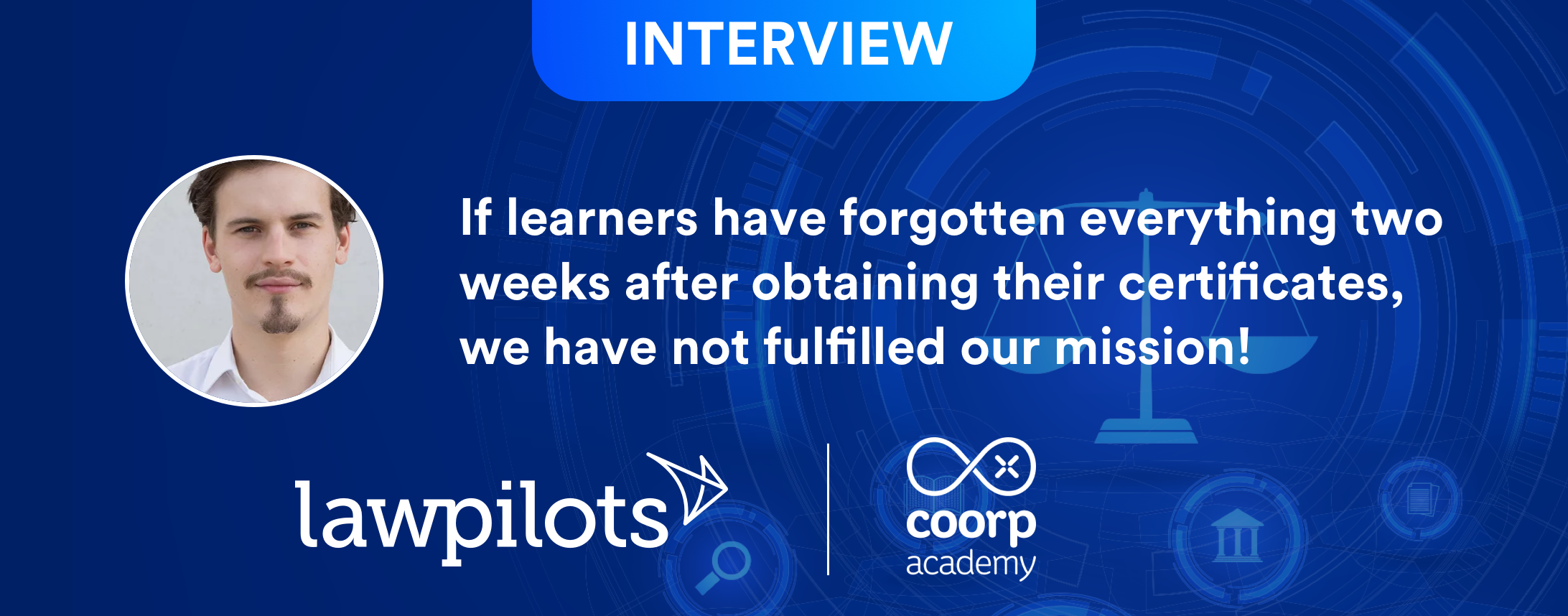How can you raise employee awareness of legal issues?
Interview

Coorpacademy and lawpilots have co-created two courses to provide the best possible education on legal issues for employees: one focuses on equal treatment of employees and the other on risks related to remote work.
Training employees online and in large numbers on legal issues is an increasingly sought-after challenge and one that does raise some questions. We posed some of them to Antoine Levollant, head of lawpilots in France, following the publication of their first two courses on the Coorpacademy platforms.
Q. First of all, what is lawpilots? What makes you a key player in online legal
education?
lawpilots, Coorpacademy’s first German partner, was established in Berlin in 2017 by a lawyer working in a law firm specialised in new technologie law and a consultant with expertise in data protection. In the course of their numerous interactions with their clients, they noticed the growing need to raise their employees’ awareness of legal issues in compliance, whether it be around data protection, anti-corruption, information security or even safety at work.. Created by trainers, lawyers and consultants, lawpilots’ modules are designed to be engaging, interactive and fun while training effectively, and staying up to date with the latest European and national legislation.
Q. lawpilots was created shortly before the European GDPR was implemented in 2018. Are we done with the GDPR?
Let’s say that the GDPR is the first “legislative outline” of a long road to regain control of the personal data that is collected online.
This is basically the main objective of the regulation: to put an end to the processing and abuse of users’ data by companies and in particular by web giants such as Facebook or Google.
So, even if it is a very small start and for us, users, it has mostly resulted in a flood of emails and notifications about the use of cookies, the main idea of the GDPR is oh so important. And we can see that under the impulse of Europe, other states and regions have followed the example. California and Brazil, for example, have introduced their own legislation to protect the data of their citizens.
Q. What other major legal challenges have you identified for companies? What educational trends are you seeing within the context of the Covid crisis and with the continuation of digital development?
Definitely Cybersecurity. The democratisation of remote work in response to COVID-19 has simply caused an explosion in the number of cyber-attacks suffered by companies. Indeed, because of the networking of computer networks, hackers have seen the number of entry points and vulnerabilities multiply!
The important thing is not to point the finger at employees as the weakest link in the IT protection system, because mistakes are and will remain human, but to support them in these changes and transformations.
This is where awareness campaigns come into their own.
Another theme is increasingly requested by companies, that is the code of conduct. We live and work in an increasingly diverse world, whether in terms of gender, origin or culture, and the workplace must be a healthy environment where people can feel integrated, respected and safe. This requires a number of rules of good conduct and behaviour to be followed. Even if this often seems to be innate to everyone, it is essential that these rules are exposed and repeated to everyone.
Q. When it comes to legal issues, how can we train the employees of large companies whose cultures, nationalities and laws differ? How do you ensure that the course content is applicable to everyone?
In order for large companies to train all their entities, we, at lawpilots, have made our modules available in more than 15 languages with content adapted by country by localising examples, legal specificities or other details such as the places mentioned or the visuals!
Our objective remains to be accessible to as many people as possible, and our credo is to make it easy to understand. We try to have an accessible language, and to deconstruct the “technical” side of the legislations, in order to make them understandable by all. The main objective is that those who follow our courses, including those done with Coorpacademy, understand the logic of the laws, remember them and apply them in their daily work.
If learners have forgotten everything two weeks after obtaining their certificates, we have not fulfilled our mission!
Q. More specifically, how do you succeed in engaging employees on these subjects related to legal issues?
The challenge is therefore to make the training accessible and understandable to everyone, especially as the compulsory nature of training on legal topics often has a negative effect on participant motivation. The idea is to stimulate their attention, using concrete situations and practical examples, which can be encountered every day. And above all, taking the learner point of view and providing them with new knowledge is what we’re looking for in the end, so that the learner is able to say to himself or herself at the end of the course “Ah, but data protection isn’t as boring as all that!” Finally, there are learning techniques that help to capture learner attention, such as storytelling. For example, in our cyber security training, employees take on the role of a hacker who wants to steal confidential information from a company.
Within Coorpacademy’s digital learning framework, we worked on this and rebuilt full courses. While we are familiar with the flipped pedagogy that Coorpacademy uses (starting with questions), the concept of alternating questions and videos is completely new to us. Our collaboration went very well!
“It’s very useful to provide greater clarity on these concepts that we are familiar with but that are sometimes not so clear!” A Faurecia platform learner
We are happy with the initial feedback, and learner feedback has demonstrated that our approach is understood.
Discover lawpilots’ courses:

